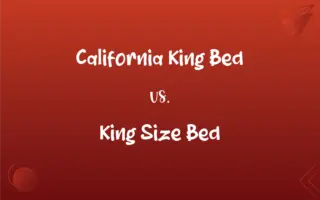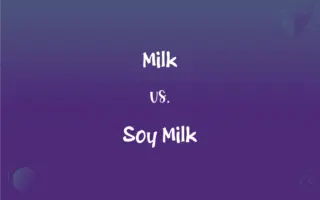ABS vs. PVC: What's the Difference?
Edited by Harlon Moss || By Janet White || Published on March 12, 2024
ABS (Acrylonitrile Butadiene Styrene) is a tough, rigid thermoplastic, while PVC (Polyvinyl Chloride) is more flexible and resistant to chemicals.

Key Differences
ABS and PVC are both popular types of plastic used in various applications. ABS is known for its toughness and resistance to impact, making it ideal for products requiring strength, such as automotive parts and building materials. On the other hand, PVC is widely recognized for its flexibility and chemical resistance, often used in plumbing, medical devices, and outdoor construction. Despite their distinct characteristics, both materials are valued for their durability and recyclability, showcasing their versatility across industries.
ABS boasts superior strength and durability, making it suitable for high-impact applications, while PVC offers unparalleled flexibility and chemical resistance, ideal for piping and medical applications. Both materials are easily moldable and have become staples in construction and manufacturing, demonstrating the wide range of applications that can benefit from their unique properties. However, the choice between ABS and PVC often comes down to the specific requirements of the application, with ABS being preferred for its mechanical robustness and PVC for its adaptability to various environmental conditions.
In terms of environmental impact and safety, ABS and PVC present different profiles. ABS is known for its ease of recycling and lower emissions during production, making it a more environmentally friendly option in some cases. Conversely, PVC has faced criticism for releasing harmful chemicals under certain conditions, although advancements in manufacturing processes have mitigated these concerns. Both materials, however, continue to be subject to ongoing research and development to enhance their safety and sustainability profiles.
When it comes to cost and availability, ABS and PVC cater to different market segments. ABS is generally more expensive due to its superior physical properties, making it a premium choice for high-end applications. In contrast, PVC's affordability and wide availability make it a popular choice for a broad range of commercial and residential projects. Despite their cost differences, both ABS and PVC remain integral to the plastics industry, offering a balance of performance and value.
The thermal properties of ABS and PVC set them apart for specific uses. ABS can withstand higher temperatures, making it suitable for applications exposed to heat, while PVC's lower thermal resistance confines its use to environments with moderate temperature ranges. This distinction is crucial in selecting the appropriate material for applications such as automotive components or building materials, where thermal performance is a key consideration.
ADVERTISEMENT
Comparison Chart
Flexibility
Less flexible, more rigid
More flexible
Chemical Resistance
Good
Excellent
Temperature Resistance
Higher temperature resistance
Lower temperature resistance
Application Examples
Automotive parts, electronic housings
Piping, medical devices
Environmental Impact
Easier to recycle, lower emissions
Concerns over chemical release
ADVERTISEMENT
ABS and PVC Definitions
ABS
A type of hard plastic used in manufacturing.
The toy was made from durable ABS.
PVC
A flexible plastic material used in construction.
The pipes were made of PVC for flexibility.
ABS
Utilized in 3D printing for its sturdiness.
We printed the prototype in ABS.
PVC
Polyvinyl Chloride, known for its versatility.
PVC is used in both medical and plumbing applications.
ABS
Acrylonitrile Butadiene Styrene, known for toughness.
ABS is preferred for its impact resistance.
PVC
Common in window frames for its durability.
Our new windows are framed with PVC.
ABS
Found in automotive components for durability.
The car's dashboard is crafted from ABS.
PVC
Found in electrical insulation for safety.
The wiring is protected by PVC insulation.
ABS
Employed in electronic casings for protection.
The ABS casing shields the device from impacts.
PVC
Used in clothing for its waterproof properties.
Her raincoat is made from shiny PVC material.
ABS
Abbreviation of abstract
PVC
A polymer of vinyl chloride used instead of rubber in electric cables
ABS
(informal) The abdominal muscles. ab
PVC
Irregularity of cardiac rhythm; recurrent occurrences can be a precursor of ventricular fibrillation
ABS
Acronym of absolute temperature
ABS
(mathematics) absolute value function
ABS
The abductor muscles of the stomach; - a contraction used by body-building and health enthusiasts. Used similarly to pecs and delts.
FAQs
What is ABS?
ABS stands for Acrylonitrile Butadiene Styrene, a tough plastic used in various applications.
What is PVC?
PVC stands for Polyvinyl Chloride, a versatile plastic commonly used in construction and medical devices.
Can ABS be used for outdoor applications?
Yes, ABS can be used outdoors, especially when treated for UV resistance, although it's less common than PVC in outdoor settings.
Can ABS be glued to PVC?
Special adhesives are required to bond ABS to PVC due to their different chemical structures.
Is PVC more flexible than ABS?
Yes, PVC is more flexible than ABS, making it ideal for applications requiring bendable materials.
Are ABS and PVC recyclable?
Yes, both ABS and PVC are recyclable, but their recycling processes differ due to their distinct chemical compositions.
Is PVC safe for drinking water?
Yes, PVC pipes are widely used for drinking water in residential and commercial plumbing systems.
Can ABS and PVC be used together in construction?
While ABS and PVC have different properties, they can be used together in construction with proper consideration of their respective strengths and weaknesses.
Do ABS and PVC have similar temperature resistances?
No, ABS generally withstands higher temperatures than PVC, making it suitable for applications exposed to heat.
Are ABS and PVC resistant to chemicals?
Both materials have good chemical resistance, but PVC is often considered superior in this regard.
What are the environmental impacts of ABS and PVC?
Both plastics have environmental impacts, but PVC has been more scrutinized for its potential health and ecological effects.
How are ABS and PVC manufactured?
Both ABS and PVC are produced through polymerization processes, but the specific chemicals and methods differ.
Can ABS and PVC be painted?
Yes, both materials can be painted, but surface preparation and suitable paint types are important for adherence.
Are there health risks associated with ABS and PVC?
Concerns have been raised about certain chemicals in PVC, but both materials are considered safe for many applications when used properly.
How do UV rays affect ABS and PVC?
UV exposure can degrade both ABS and PVC, but both materials can be treated with UV stabilizers to prolong their outdoor usability.
What are the key factors in choosing between ABS and PVC for a project?
Factors include the application's specific requirements, such as flexibility, temperature resistance, and exposure to chemicals or UV light.
Can ABS be used in medical devices?
ABS is used in some medical devices, but PVC is more common due to its flexibility and chemical resistance.
Is PVC more affordable than ABS?
Generally, PVC is more affordable than ABS, making it a popular choice for a wide range of applications.
How are ABS and PVC used in automotive applications?
ABS is commonly used for interior and exterior car parts, while PVC may be used for wiring insulation and interior trims.
What is the impact resistance of ABS compared to PVC?
ABS typically has higher impact resistance than PVC, making it suitable for protective gear and durable components.
About Author
Written by
Janet WhiteJanet White has been an esteemed writer and blogger for Difference Wiki. Holding a Master's degree in Science and Medical Journalism from the prestigious Boston University, she has consistently demonstrated her expertise and passion for her field. When she's not immersed in her work, Janet relishes her time exercising, delving into a good book, and cherishing moments with friends and family.
Edited by
Harlon MossHarlon is a seasoned quality moderator and accomplished content writer for Difference Wiki. An alumnus of the prestigious University of California, he earned his degree in Computer Science. Leveraging his academic background, Harlon brings a meticulous and informed perspective to his work, ensuring content accuracy and excellence.






































































